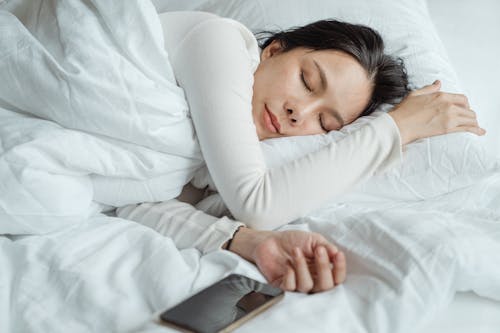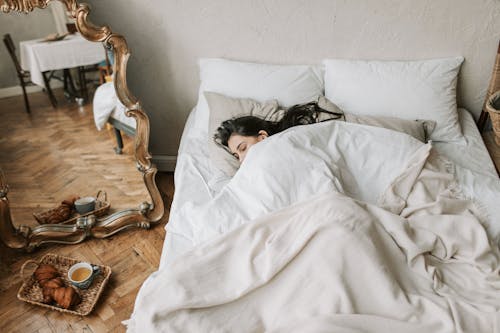
Revenge Bedtime Procrastination: What is it and how to fix it
Do you ever find yourself at around 7pm, you’re finished work and you’re thinking, right, I’m going to go to bed early, do a little skincare and be asleep by eleven, wake up early, go for a run before work and be super productive?
And then completely fail to do everything you just said you would?
Us too. It happens. But when it’s something that happens consistently, then maybe it’s time to look into why it’s happening. Staying up til one or two in the morning isn’t exactly destructive behaviour, but it’s not exactly very conducive to either your health or the structure of your day either.
The term ‘revenge bedtime procrastination’ might not be familiar to you, because it’s a trend that is really only beginning to be examined by sleep psychologists and experts in work-life balance.

For many people who still work from home, their bedroom is also their office and their laptop they work from is also a source of entertainment for after hours. Switching off from ‘work mode’ to ‘relaxing mode’ has become increasingly difficult and as a result, many of us are trying to make up for entertainment and relaxing time we feel we’ve lost by stealing from our sleep schedule.
According to the Sleep Foundation, ‘revenge bedtime procrastination’ is ‘the decision to sacrifice sleep for leisure time that is driven by a daily schedule lacking in free time. For people in high-stress jobs that take up the bulk of their day, revenge bedtime procrastination is a way to find a few hours of entertainment even though it results in insufficient sleep.’
Knowing you should try to sleep and putting it off can be the result of many things. Although we may intend to get an early night, if we stay up too late anyway, it’s known as an intention-behaviour gap. It could be a result of feeling overworked, trying to reclaim leisure time, improper work-life balance, inability to switch off or any number of things – but most importantly, it’s believed to be a failure of self-regulation or self-control that is harmful to yourself. But it’s important to stop this bad habit in its tracks before you compromise both your mental and physical health. Not only is doing this completely messing up your sleep schedule, but it’s also going to have an affect on your job performance, mood and mental wellbeing.
Recharging by doing things we love and find relaxing is important, but a proper night’s sleep is equally important. Here are some things you can do to make your routine and bedroom a more sleep-friendly space to help you to wind down and fall asleep more easily.
Put away your screens

I know, I know, easier said than done. A lot of the things we like to do to unwind nowadays are on screens – movies, books, music, even just mindless scrolling. But screens are one of the worst culprits for keeping you from sleeping, as studies are increasingly showing. Similarly, to how not getting enough daylight during the day can deregulate you, getting too much blue light at the wrong time – light literally designed to wake you up – can ruin your chances of drifting off naturally.
Even if it’s something that might feel relaxing – watching TV, scrolling Pinterest or Instagram – it isn’t relaxing for your brain. It becomes stimulated and makes it that bit harder to switch off at your designated sleep time. Experts recommend reading a book or doing something non-screen related for at least an hour before bed. But if that’s totally impossible, some tech has an orange light or night mode installed for these reasons. They’re still not ideal, but if you want to pick up your kindle to read before bed, turning on the blue-light filter might be a good idea.
Find ways to calm your mind – not just distract it

If you’re mind comes alive with every worry you’ve ever had at night, you’re not alone. We’ve all been there. Whether it’s a big presentation you have tomorrow, or a door you’re unsure if you locked, or even just, ‘God, that sounded stupid when I said it earlier’, we’ve all been kept up with a brain that won’t shut up. There are lot so reasons for this, big and small but I’ve found some little tips and tricks that work.
One idea is to contextualise it. Will anyone other than me remember what I said today in a week’s time? Probably not. Another is to keep a notebook by the bed. Instead of reaching for your phone to distract you from niggling thoughts, write down what’s bothering you. Make a list of what needs to be done tomorrow before the presentation so you can let those thoughts go and relax. And my favourite; a guided sleep meditation on YouTube. Fall asleep to the sound of relaxing sleep music or a soothing soft voice specifically designed to make you feel drowsy and relaxed. My favourite is Jason Stephenson on YouTube, but there’s plenty out there to discover what’s right for you!
Figure out your sleep schedule

One of the first steps to address in getting a night’s sleep is regulating your body. It is essential that your body and brain begin to expect a shut-down and wake-up call at the same time every day. Yes, even the weekends. We’re all guilty of enjoying our sleep ins and late nights on our days off but be sure to only indulge in those occasionally. They disrupt the training that your brain is undergoing to move into a state suitable for sleep and rising.
Have a routine

We are creatures of habit. Most of us enjoy things going the way we expect them to and having cues to follow. The same thing applies to your bedtime routine. If your bedtime routine isn’t a relaxing one, then there’s no hope of it helping you wind down before bed. But having a ritual every night before sleep can send our brain cues that it’s time to start winding down and thinking about and preparing for sleep.
So whether that’s an extensive skincare routine, listening to a meditation or relaxing music or even tidying up your desk and your room, have a ritual that you associate with winding down, finishing up the day and putting you into the optimum mindset for sleep.





